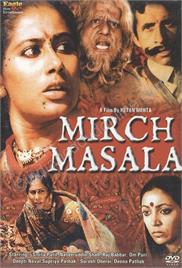Be Careful of Fake Websites. Always use HindiMovies.to domain & Join our Telegram Channel for Latest Updates.

Likes: 24
Views: 2.81K
In colonial India, subedars (tax collectors) went from village to village, with soldiers, often demanding more than taxes. A subedar commands Sonbai, a beautiful and confidant women whose husband is away in the city, to sleep with him. She slaps him and flees for safety to a spice factory where women grind chillies into fine powder. The aged factory guard, Abu Mian, locks the door behind her, refusing to open it to the soldiers, to the cowardly village men led by the mayor, and to the subedar himself. The town’s teacher, who follows Gandhi, and a few women, led by the mayor’s wife, protest ineffectually against this village-approved rape. The stage is set for a final confrontation.
Duration: 128 min
Released: 1989
IMDb Rating: 7.9/10 (530 Votes)
Genre: Drama, Hindi Movies, Thriller
Stars: Benjamin Gilani, Mohan Gokhale, Ram Gopal Bajaj, Nina Kulkarni
Directors: Ketan Mehta
Writers: Hriday Lani, Shafi Hakim, Ketan Mehta, Trijawani Sharma
Year: 1985
Server 1 – Dailymotion
Watch Part 1
Watch Part 2
Watch Part 3
Watch Part 4
Server 2 – Bitvid
Watch Part 1
Watch Part 2
Watch Part 3
Watch Part 4
Server 3 – Youtube
Mirch Masala (1986): A Powerful Tale of Courage and Resistance
Mirch Masala, released in 1986, is a critically acclaimed Indian drama and thriller film that has left a significant mark on Hindi cinema. Directed by Ketan Mehta, this cinematic gem unfolds a gripping narrative about oppression, resilience, and female empowerment in a rural Indian setting during colonial times. With a compelling script penned by Ketan Mehta himself, the movie features stirring performances from some of the most talented actors of the era, including the legendary Smita Patil and Naseeruddin Shah.
Plot Summary
The film is set in a small village in colonial India where the villagers lead a life bound by strict social hierarchies and the oppression of powerful men. At the heart of the story is Sonbai, played masterfully by Smita Patil, a spirited woman working in a masala (spice) factory. Sonbai and her fellow workers find themselves repeatedly targeted and terrorized by the local colonial subedar (a rank equivalent to a local military officer) who abuses his power by trying to assert control over the women.
The movie builds its narrative as Sonbai courageously resists the subedar’s advances, which enrages the tyrant and escalates tensions within the village. This results in a tense confrontation between the oppressed villagers and the subedar’s force, highlighting themes of dignity, self-respect, and the power of collective resistance. The spice factory, a microcosm of the village, becomes a battlefield where Sonbai and the village women, armed with nothing but their courage and solidarity, refuse to bow down to tyranny.
Main Actors and Their Roles
While the film primarily revolves around these leads, the supporting cast ably underscores the social milieu, enriching the story’s tapestry and adding authenticity to the portrayal of rural India.
Direction and Writing
Ketan Mehta, both the director and writer of Mirch Masala, is known for his socially conscious cinema that often tackles issues of oppression and human rights. In this film, Mehta’s direction is meticulous, as he deftly captures the oppressive environment and the simmering tensions within the village community. His screenplay stands out for its powerful dialogues and realistic depiction of gender and power dynamics during the period.
Music and Songs
Unlike many Bollywood films that lean heavily on musical numbers, Mirch Masala takes a more restrained approach musically, aligning with its intense dramatic tone. The film’s music and background score, composed by Vanraj Bhatia, create an evocative atmosphere that supports rather than overshadows the storytelling. There are no typical Bollywood song-and-dance sequences; instead, the emphasis is on keeping the narrative raw and grounded.
Cinematic Significance and Themes
Mirch Masala is celebrated for its feminist overtones and socio-political relevance. The film portrays the struggle of women caught in the web of patriarchy and colonial injustice. Through Sonbai’s unwavering stand, the movie explores themes of courage, justice, and collective action. It serves as a poignant reminder of the often-unheard voices of rural Indian women and their silent resistance against tyranny.
The film’s powerful storytelling, along with its artful cinematography and compelling performances, helped it earn commercial and critical acclaim both in India and internationally. It remains a significant work in Indian cinema for how it artfully combines social commentary with gripping drama.
Conclusion
Mirch Masala stands as a landmark film that dares to confront difficult questions about power, gender, and justice. With Ketan Mehta’s visionary direction, Smita Patil’s indelible portrayal of Sonbai, and a rich, evocative narrative, the film remains as relevant today as it was upon its release in 1986. It is a must-watch for anyone interested in cinema that not only tells a story but also ignites a conversation about societal change.
For more detailed information, you can visit the movie’s official IMDb page here.